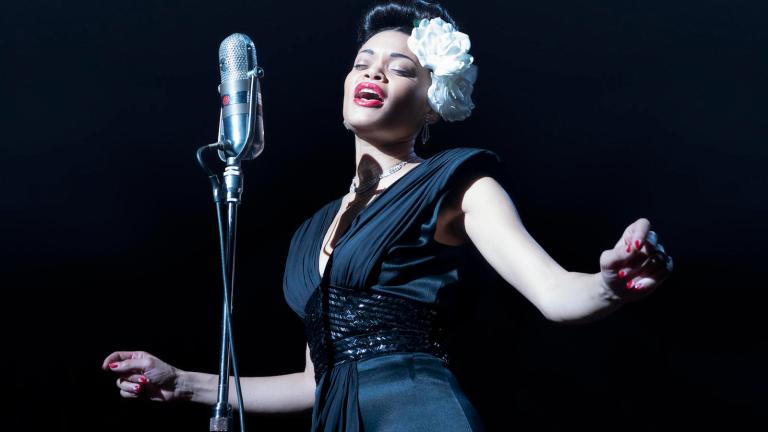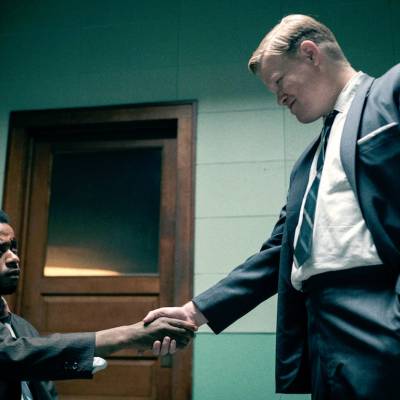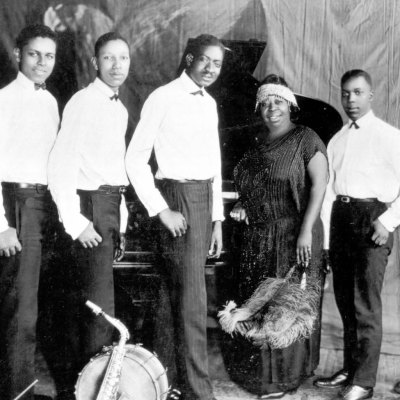The United States vs. Billie Holiday: The Federal Bureau of Narcotics Was Formed to Kill Jazz
Lee Daniels was being kind in The United States vs. Billie Holiday about how the Treasury Department waged a vicious vendetta with extremely selective enforcement.

This article contains The United States vs. Billie Holiday spoilers.
Federal drug enforcement was created for the express purpose of persecuting Billie Holiday. Director Lee Daniels’ The United States vs. Billie Holiday focuses a cinematic microscope on the events, but a much larger picture is visible just outside the lens. Holiday’s best friend and one-time manager Maely Dufty told mourners at the funeral that Billie was murdered by a conspiracy orchestrated by the narcotics police, according to Chasing the Scream: The First and Last Days of the War on Drugs by Johann Hari. The book also said Harry Anslinger, head of the Federal Bureau of Narcotics, was a particularly virulent racist who hounded “Lady Day” throughout the 1940s and drove her to her death in the 1950s.
This is corroborated in Billie, a 2020 BBC documentary directed by James Erskine, and Alexander Cockburn’s book Whiteout: The CIA, Drugs, and the Press, which also claims Anslinger hated jazz music, which he believed brought the white race down to the level of African descendants through the corrupting influence of jungle rhythms. He also believed marijuana was the devil’s weed and transformed the post-Prohibition fight against alcohol into a war on drugs. The first line of battle was against the musicians who partook.
“Marijuana is taken by… musicians,” Anslinger testified to Congress prior to the vote on the 1937 Marijuana Tax Act. “And I’m not speaking about good musicians, but the jazz type.” The LaGuardia Committee, appointed in 1939 by one of the Act’s strongest opponents, New York City Mayor Fiorello LaGuardia, ultimately refuted every point made in the effective drug czar’s testimony. Based on the findings, “the Treasury Department told Anslinger he was wasting his time,” according to Chasing the Scream. The opportunistic department head “scaled down his focus until it settled like a laser on one single target.”
Federal authorization of selective enforcement should come as no surprise. Just this month, HBO Max released Judas and the Black Messiah about how the FBI and local law enforcement targeted the Black Panthers and put a bullet in the back of the head of Fred Hampton after he was apparently drugged by the informant. In MLK/FBI (2020), director Sam Pollard used newly declassified files to fill in the gaps on the story of the U.S. government’s surveillance and harassment of Martin Luther King, Jr. Days ago, The Washington Post reported the daughters of assassinated civil rights leader Malcolm X requested his murder investigation be reopened in light of a deathbed letter from officer Raymond A. Wood, alleging New York police and the FBI conspired in his killing.
During the closing credits of The United States vs. Billie Holiday we read that Holiday, played passionately by Andra Day in the film, was similarly arrested on her deathbed. She was in the hospital suffering from cirrhosis of the liver when she was cuffed to her bed. They don’t mention police had been stationed outside her door barring family, fans, and well-wishers from offering the singer comfort as she lay dying. They also don’t mention that police removed gifts people brought to the room, as well as flowers, radio, record player, chocolates, and any magazines. When she died at age 44, it was found that Holiday had 15 $50 bills strapped to her leg, the remainder of her money after years of top selling records. Billie intended to give it to the nurses to thank them for looking after her.
As The United States vs. Billie Holiday points out, the feds had been watching Holiday since club owner Barney Josephson encouraged her to sing “Strange Fruit” at the integrated Cafe Society in Greenwich Village in 1939. Waiters would stop all service during the performance of the song. The room would be dark, and it would never be followed by an encore.
The lyric came from a three-stanza poem, “Bitter Fruit,” about a lynching. It was written by Lewis Allan, the pseudonym of New York schoolteacher and songwriter named Abel Meeropol, a costumer at the club. Meeropol set the words to music, and the song was first performed by singer Laura Duncan at Madison Square Garden.
Holiday and her accompanist Sonny White adapted Allan’s melody and chord structure, and released the song on Milt Gabler’s independent label Commodore Records in 1939. The legendary John Hammond, who discovered Holiday in 1933 while she was singing in a Harlem nightclub called Monette’s, refused to release it on Columbia Records, where Billie was signed.
The song “marked a watershed,” according to David Margolick’s 2000 book Strange Fruit: Billie Holiday, Cafe Society, and an Early Cry for Civil Rights. Influential jazz writer Leonard Feather called the song “the first significant protest in words and music, the first significant cry against racism.”
Holiday experienced the brutally enforced racial segregation of the Jim Crow laws during her trips south with her bands, according to Billie Holiday, the 1990 book by Bud Kliment. She was also demeaned at the Lincoln Hotel in New York City in October 1938 when management demanded she walk through the kitchen and use the service elevator to get on the stage. Holiday also caught flak for being considered too light skinned to sing with one band, and was on at least one occasion forced to wear special makeup to darken her complexion.
Holiday was 18 years old when she recorded her first commercial session with Benny Goodman’s group at Columbia Records, but knew firsthand that an integrated band would be more threatening than an all-Black group. According to most biographies, Holiday began using hard drugs in the early ’40s under the influence of her first husband, Jimmy Monroe, brother of the owner of Monroe’s Uptown House in Harlem.
Anslinger, the first commissioner for the Federal Bureau of Narcotics, was an extreme racist, even by the standards of the time, according to Chasing the Scream. He claimed narcotics made black people forget their place in the fabric of American society, and jazz musicians created “Satanic” music under pot’s influence.
The United States vs. Billie Holiday doesn’t shy away from the drug czar’s blatant racism, but Garrett Hedlund’s Harry J. Anslinger doesn’t capture the full depths of the disgust the man felt and put into practice through his selective enforcement. Hedlund is able to mouth some of the epithets his character threw at ethnic targets, but most of the actual quotes on record are so offensive there is no need to subject any audience to them today. The film barely even mentions the strange and forbidden fruit imbibed in slow-burning paper that Anslinger obsessed over almost as much as Holiday’s song.
Commissioner Anslinger came to power during the “Reefer Madness” era, and shaped much of the anti-marijuana paranoia of the period, according to Alexander Cockburn’s Whiteout: The CIA, Drugs, and the Press. His first major campaign was to criminalize hemp, rebranding it as “marijuana” in an attempt “to associate it with Mexican laborers.” He claimed the drug “can arouse in blacks and Hispanics a state of menacing fury or homicidal attack.”
Anslinger promoted racist fictions and singled out groups he personally disliked as special targets. He said the lives of the jazzmen “reek of filth,” and the genre itself was proof that marijuana drives people insane. On drug raids, he advised his agents to “shoot first.” Anslinger persecuted many black musicians, including Thelonious Monk, Charlie Parker, Dizzy Gillespie and Duke Ellington. When Louis Armstrong was arrested for possession, Anslinger orchestrated a nationwide media smear campaign.
The Federal Bureau of Narcotics’ “race panic” tactics had a double standard. Anslinger only had a “friendly chat” with Judy Garland over her heroin addiction, suggesting she take longer vacations between films. He wrote to MGM, reporting he observed no evidence of a drug problem.
Anslinger ordered Holiday to cease performing “Strange Fruit” almost immediately after word got out about the performances. When she refused, he sent agent Jimmy Fletcher to frame the singer. Anslinger hated hiring Black agents, according to both Whiteout and Chasing the Scream, but white officers stood out on these investigations. He did insist no Black man in his Bureau could ever be a boss to white men, and pigeonholed officers like Fletcher to street agents.
Donald Clark and Julia Blackburn studied the only remaining interview with Jimmy Fletcher for their biography Billie Holiday: Wishing on The Moon. That interview has since been lost by the archives handling it. According to their book when Fletcher first saw Billie at the raid on her brother-in-law’s Philadelphia apartment in May 1947, “She was drinking enough booze to stun a horse and hoovering up vast quantities of cocaine.”
Fletcher’s partner sent for a policewoman to conduct a body search. “You don’t have to do that. I’ll strip,” Billie said before stripping and marking her territory in a provocative show of non-violent defiance by urinating on the floor (another action Daniels’ movie glosses over). Holiday was arrested and put on trial for possession of narcotics.
According to Hettie Jones’ book Big Star Fallin’ Mama: Five Women in Black Music, Holiday “Signed away her right to a lawyer and no one advised her to do otherwise.” She thought she would be sent to a hospital to kick the drugs and get well. “It was called ‘The United States of America versus Billie Holiday,’” she recalled in Lady Sings the Blues, the 1956 memoir she co-wrote with William Dufty, “and that’s just the way it felt.” Holiday was sentenced to a year and a day in a West Virginia prison. When her autobiography was published, Holiday tracked Fletcher down and sent him a signed copy.
When Holiday was released in 1948, the federal government refused to renew her cabaret performer’s license, which was mandatory for performing in any club serving alcohol. Under Anslinger’s recommended edict, Holiday was restricted “on the grounds that listening to her might harm the morals of the public,” according to the book Lady Sings the Blues.
The jazz culture had its own code. Musicians not only wouldn’t rat out other musicians, they would chip in to bail out any player who got popped. When it appeared Fletcher, who shadowed Holiday for years, became protective of Holiday, Anslinger got Holiday’s abusive husband and manager Louis McKay to snitch.
Two years after Holiday’s first conviction, Anslinger recruited Colonel George White, a former San Francisco journalist who applied to join the Federal Bureau of Narcotics. The personality test given to all applicants determined White was a sadist, and he quickly rose through the bureau’s ranks. He gained bureau acclaim as the first and only white man to infiltrate a Chinese drug gang.
White had a history of planting drugs on women and abused his powers in many ways. According to Chasing the Scream: The First and Last Days of the War on Drugs, after White retired from the Bureau, he bragged, “Where else [but in the Bureau of Narcotics] could a red-blooded American boy lie, kill, cheat, steal, rape and pillage with the sanction and blessing of the All-Highest?” He “may well have been high when he busted Billie for getting high,” according to Chasing the Scream.
White arrested Holiday, without a warrant, at the Mark Twain Hotel in San Francisco in 1949. Billie insisted she had been clean for over a year, and said the dope was planted in her room by White. Bureau agents said they found her works in the room and the stash in a wastepaper basket next to a side room. They never entered the kit into evidence. According to Ken Vail’s book Lady Day’s Diary, Holiday immediately offered to go into a clinic, saying they could monitor her for withdrawal symptoms and that would prove she was being framed. Holiday checked herself into the clinic, paying $1,000 for the stay and she “didn’t so much as shiver.” She was not convicted by jury at trial.
Afterward White attended one of Holiday’s shows at the Café Society Uptown and requested his favorite songs. After the show was over, the federal cop told Billie’s manager “I did not think much of Ms. Holiday’s performance.”
In 1959, Billie collapsed while at the apartment of a young musician named Frankie Freedom. After waiting on a stretcher for an hour and a half, Manhattan’s Knickerbocker Hospital turned her away, saying she was a drug addict. Recognized by one of the ambulance drivers, Holiday was admitted in a public ward of New York City’s Metropolitan Hospital. She lit a cigarette as soon as they took her off oxygen.
In spite of being told her liver was failing and cancerous, and her heart and lungs were compromised, Holiday did not want to stay at the hospital. “They’re going to kill me. They’re going to kill me in there. Don’t let them,” she told Maely Dufty.
Billie went into heroin withdrawal, alone. When Holiday responded to methadone treatment, Anslinger’s men prevented hospital staff from administering any further methadone, even though it had been officially prescribed by her doctor. Drug cops claimed to find a tinfoil envelope containing under an eighth of an ounce of heroin. It was found hanging on a nail on the wall, six feet from Billie’s bed where the frail and restrained artist could not have reached it.
The cops handcuffed her to the bed, stationed two policemen at the door and told Holiday they’d take her to prison if she didn’t drop dime on her dealer. When Maely Dufty informed the police it was against the law to arrest a patient in critical care, the cops had Holiday taken off the list.
Outside the hospital, protesters gathered on the streets holding up signs reading “Let Lady Live.” The demonstrations were led by the Rev. Eugene Callender. The Harlem pastor, who built a clinic for heroin addicts in his church, requested the singer be allowed to be treated there.
Holiday didn’t blame the cops. She said the drug war forced police to treat people like criminals when they were actually ill.
“Imagine if the government chased sick people with diabetes, put a tax on insulin and drove it into the black market, told doctors they couldn’t treat them, then sent them to jail,” she wrote in Lady Sings the Blues. “If we did that, everyone would know we were crazy. Yet we do practically the same thing every day in the week to sick people hooked on drugs.”
Holiday’s social commentary didn’t end with “Strange Fruit.” She wrote and sang about racial equality in the song “God Bless the Child,” her voice captured the pains of domestic violence. Most of Holiday’s contemporaries were too scared of being hassled by the feds to perform “Strange Fruit.” Billie Holiday refused to stop. She was killed for it. But never silenced.
The United States vs. Billie Holiday is streaming on Hulu now.


